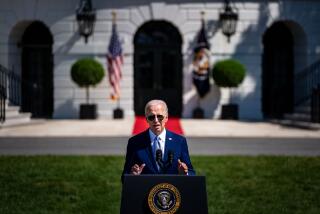Senate Panel Votes Not to Tax Current Municipal Bonds
- Share via
WASHINGTON — The Senate Finance Committee defeated Chairman Bob Packwood (R-Ore.) on the first test of his tax overhaul plan Monday, unanimously agreeing that it will make no effort to tax any municipal bonds issued by the end of this year.
But the committee eagerly went along with Packwood on an issue even closer to the hearts of most members, accepting his proposal to retain nearly all existing tax breaks for oil drilling, timber and farming.
The House, in approving its version of tax-revision legislation last December, voted to increase taxes on oil, timber and other natural-resource industries by an estimated $8.8 billion over five years by scaling back several current tax preferences.
No Vote Taken
Although the taxation of energy was one of the most hotly contested issues in the House Ways and Means Committee, the Senate panel basically ratified Packwood’s proposals on natural-resource industries and agriculture without taking a vote or considering even a single amendment. Several senators said they might offer relatively small alterations later as the committee continues to fashion its own tax bill.
The action by the committee on tax-exempt bonds was designed to calm the nerves in the market for municipal bonds, which panicked last week after Packwood proposed that interest on current tax-exempt bonds be gradually made subject to a 20% minimum tax.
The committee voted 19 to 0--with Packwood joining in opposition to his own proposal--that it would not impose any minimum tax on the approximately $600 billion in outstanding tax-exempt bonds and any additional bonds that are issued before Jan. 1, 1987. The members plan to decide later whether the minimum tax should be applied to bonds issued after that date.
‘Hanging in the Fire’
The quick move on the volatile issue would help state and local governments whose bonds “had been hanging in the fire” since last week, Sen. Lloyd Bentsen (D-Tex.) said.
Committee members conceded that the action assures many wealthy taxpayers that they may continue to escape federal income taxes by buying tax-exempt bonds. But they argued that it is unfair to impose a retroactive tax on municipal bonds because most investors agreed to accept lower interest rates on the expectation that the bonds would be tax-free.
“To tax them after they’ve been bought,” Sen. Russell B. Long (D-La.) said, “is a violation of faith” with tax-exempt bond investors.
Under the House bill, only future tax-exempt bonds that are not strictly devoted to traditional government activities would be subject to the minimum tax.
Cite Constitution
In the committee, some senators argued that any taxation of municipal bonds would be contrary to the Constitution.
Under current law, however, some municipal bonds are already subject to taxation if they are owned by relatively well-to-do investors who also have Social Security income.
A case is pending before the Supreme Court to settle the issue of whether Congress acted constitutionally when it voted in 1983 to impose a tax on high-income Social Security recipients that takes into account income from tax-exempt bonds and to require states to register their tax-exempt bonds with the Treasury Department.
Tax Breaks Retained
The Senate committee, after disposing of the municipal bond issue, temporarily got bogged down on procedural issues before rapidly agreeing to retain existing tax breaks for oil, timber and other natural-resource industries that enjoy strong support on the panel.
Among the provisions that the committee accepted, at least temporarily, was Packwood’s proposal to retain the 10% investment tax credit for small timber producers. The investment tax credit would be eliminated for all other investments under Packwood’s tax package.
Packwood and Long, the senior Democrat on the panel, defended the existing timber tax preferences as necessary to prevent a depressed industry from suffering further from intense foreign competition. Both senators have extensive lumber operations in their states.
More to Read
Get the L.A. Times Politics newsletter
Deeply reported insights into legislation, politics and policy from Sacramento, Washington and beyond. In your inbox twice per week.
You may occasionally receive promotional content from the Los Angeles Times.










